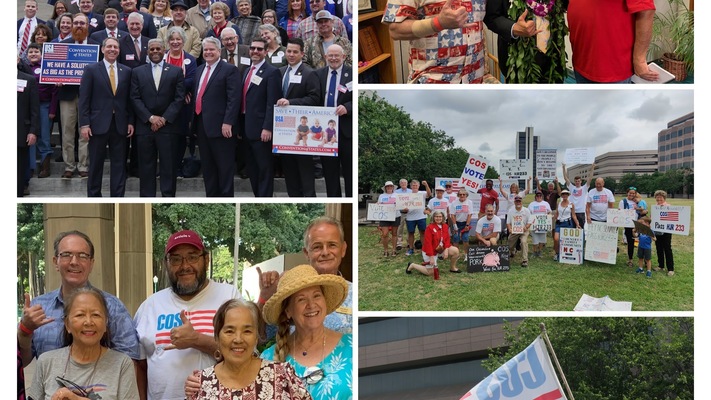In celebration of ten years of Convention of States’ grassroots activism and success, I recently set out on a cross-country tour—via phone—in search of an answer—what holds COS, sprawled out over all 50 states, together? What unites our five million supporters into one unwavering monolith? Assembling in under a decade the largest grassroots army in American history is no easy nor ordinary task. What common threads, if any, hold the whole thing together?
The first thing I noticed is that each state team is, well… distinctly from that state. That is to say, each team has openly embraced and incorporated their respective state’s culture into their mission. It really is quite beautiful.
But running beneath this all is something that transcends state partitions—a culture that is distinctly and recognizably COS.
There is perhaps no greater example of this than Hawaii, where grassroots coordinator Brett Kulbis—a breezy man who welcomed me with a boisterous “Aloha!”—told me the island's native spirit of “ohana” encompasses all the state team does there.
“One of the things that the Hawaiian culture gives us is the sense of what we call ‘ohana’—family,” he said, as island birds sang softly in the background. “There’s a long cultural history of what they call hānai family, and basically that’s like an adopted family.”
Brett, who lives on Oʻahu, passed the time recounting stories of his hānai family, describing how he cares for fellow team members as his own. Naturally, they do the same for him. Ultimately, he believes this ethos of adoption permeates all of COS.
“That’s what Hawaii brings—it transfers great into what Convention of States is. We’re a big family. I can go to any state, go to a Convention of States meeting, say I’m from Hawaii, and I’d be more than welcome to participate and join.”
When Mark Meckler, president of Convention of States, arrived on the island for a visit in 2022, Kulbis recalled, Meckler commented, “I’m finally in your backyard again.”
“Wait, Mark, that’s not true. You’re in your backyard, too,” the team reminded him. “You’re family here.”
While other states may not articulate it quite like our brothers and sisters in Hawaii do, Brett is, of course, right. This arms-wide-open, welcoming spirit is characteristic of COS patriots everywhere.
SEE ALSO: 'To prevent our becoming slaves': The George Mason story
For instance, when I spoke with Bruce Cook from Mississippi earlier this year, he repeatedly expressed the centrality of relationships to the COS mission.
“It’s about relationships,” he said. “It’s about relationships with legislators. It’s about relationships with COS team members. And it takes time to build, especially quality relationships. You need to get to know their spouses’ names, things about the family—every family has things that are worrying them—learn a little about them. Just start building those bonds. And the more you build, the more effective you and the organization will become.”
Mr. Cook would know. Diagnosed with cancer in 2020, he says the connections and friendships he formed through COS have supported him every step of the way. In fact, when Bruce could not access his immunotherapy due to a worldwide shortage, a close friend, Dr. Smith, whom he had met through Convention of States, miraculously arranged for Bruce to receive his treatment.
“None of this would have happened without… COS,” he told me.
SEE ALSO: New class of emerging leaders join the fight for self-governance
United under the banner of calling history’s first-ever Article V convention, the grassroots are also united by their shared love for new ideas; indeed, you could call it a passion. Ever innovating, ever conjuring up avant-garde strategies for spreading the word about COS, our grassroots activists make up an unsleeping army determined to save liberty no matter the cost or how long it takes. In ten years, they have not yet stopped growing. They have not yet stopped dreaming.
Bob Kennedy of South Carolina is one such activist. Virtually bristling with new ideas to implement in his state, Mr. Kennedy said that although he sometimes is discouraged by the organization's seeming lack of progress, he finds inspiration in Winston Churchill’s famed charge to a Nazi-beset Great Britain: “Never ever, ever, ever give up,” he paraphrased. “Keep fighting.”
“I think we need constant reminders,” he continued, “of why it’s worth it; constant reminders, or encouragement, to stick with it, to do more, work harder, talk to more people…. That’s actually probably one of my motivators.”
Unsurprisingly, Bob, like everyone else I spoke to, eventually circled back to an unavoidable shtick—the importance of serving alongside one’s COS family.
“When I’m working with other people who are working on this mission, I get pumped up just being around them. I’m going to suggest that you do that—that any and every time you have an opportunity to work on this mission with others—whatever it is, whether it’s at an event or manning a table or just going to a routine weekly or biweekly meeting—do that,” he advised.
Throughout my involvement in this project, I’ve watched conversation after conversation turn inescapably to the topic of the COS ohana. Yes, COS has built an army, but we’ve also built a family—one that knows no borders. That grassroots from states as culturally divergent as Hawaii and Mississippi can end up articulating virtually the same sentiment about what it means to be a part of this family is truly remarkable.
Brett Kulbis summed it up best. In telling me how the Hawaii team immediately rallied to help those impacted by the recent fires in Maui, he delivered a telling line—“That’s just what we do.”
Anyone who’s spent any amount of time with the COS grassroots army in any of the 50 states knows, of course, that this is true.
I set out to learn what holds the COS grassroots together. Here's what I discovered.
Published in Blog on September 08, 2023 by Jakob Fay






